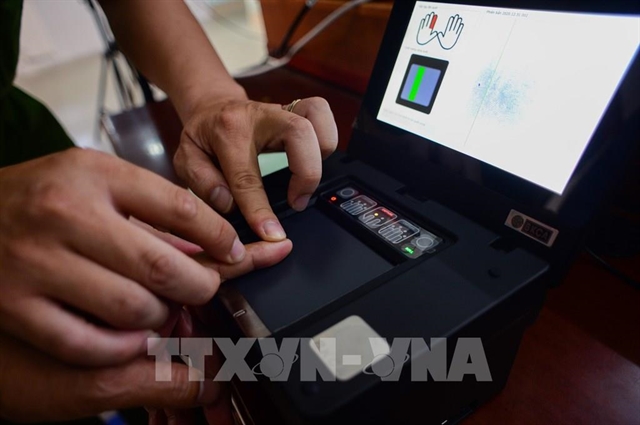 Society
Society


|
| Fingerprinting to serve the issuance of citizens' ID cards with electronic chips. —VNA/VNS Photo |
HÀ NỘI — The old and new versions of citizens’ identification cards are set to be completely integrated this year, enabling the e-identification of all people.
It is one of the targets of the project on developing the application of population database, e-identification, and e-authentication to serve the national digital transformation in the 2022-25 period, vision towards 2030.
Prime Minister Phạm Minh Chính recently signed Decision No 06/ QĐ-TTg giving the green light to the project.
All individuals and businesses in the country are expected to use the online public service at level 4 to deal with administrative procedures from the central to local level in the period of 2023-25.
It allows users to fill in and send application forms to the People’s Committees at the commune or ward level entirely online. The forms are then processed online and users can pay the fees online.
The project also targets that the national population database, e-identification, and e-authentication system as well as citizen ID cards with electronic chips will be used flexibly and creatively to serve administrative procedures and online public services, socio-economic development, and digital citizens.
The connection and sharing of data between the national population and tax databases are expected to complete in the first quarter of this year.
Personal paper documents, including health insurance card, driving licence, job licence, and vaccination certificate, will be generally integrated into the citizen’s IDs and the e-identification app VNEID.
Also this year, e-authentication will be used for all information provided on the citizen IDs and VNEID.
Meanwhile, in 2022-23, the e-identification and e-authentication system will be upgraded, completed, and applied in e-transactions serving socio-economic development.
Chính assigned Deputy Prime Minister Vũ Đức Đam to direct the project implementation and deal with relevant matters.
Additionally, Tô Lâm, Minister of Public Security, has been tasked to be head of the working group on the project implementation while officials of ministries of Planning and Investment, Education and Training, Labour, Invalids and Social Affairs and other relevant agencies are members of the working group.
The working group has been told to make periodic reports to Đam about the results of the project’s implementation.
The working group is allowed to direct the Police Department for Administrative Management of Social Order under the Ministry of Public Security and the Department for Control of Administrative Procedures under the Government Office as well as mobilise domestic and international experts to perform assigned tasks. — VNS